Research: EI Implications on Project Management at M.H. Alshaya Co
VerifiedAdded on 2023/01/04
|65
|17725
|31
Report
AI Summary
This research report investigates the impact of emotional intelligence (EI) on project management within M.H. Alshaya Co. The study examines various aspects, including the meaning and concept of EI and project management, the implications of EI on project management, and recommended strategies for integrating EI into project management practices. The research employs a deductive approach and a descriptive method, collecting data through questionnaires administered to 150 employees. The findings suggest that emotional intelligence positively influences project management. The report further explores different EI models, the skills needed by project managers, and the impact of EI on various project activities, providing valuable insights for organizations aiming to improve project outcomes. Recommendations include increasing understanding of different EI models and their effective implementation.
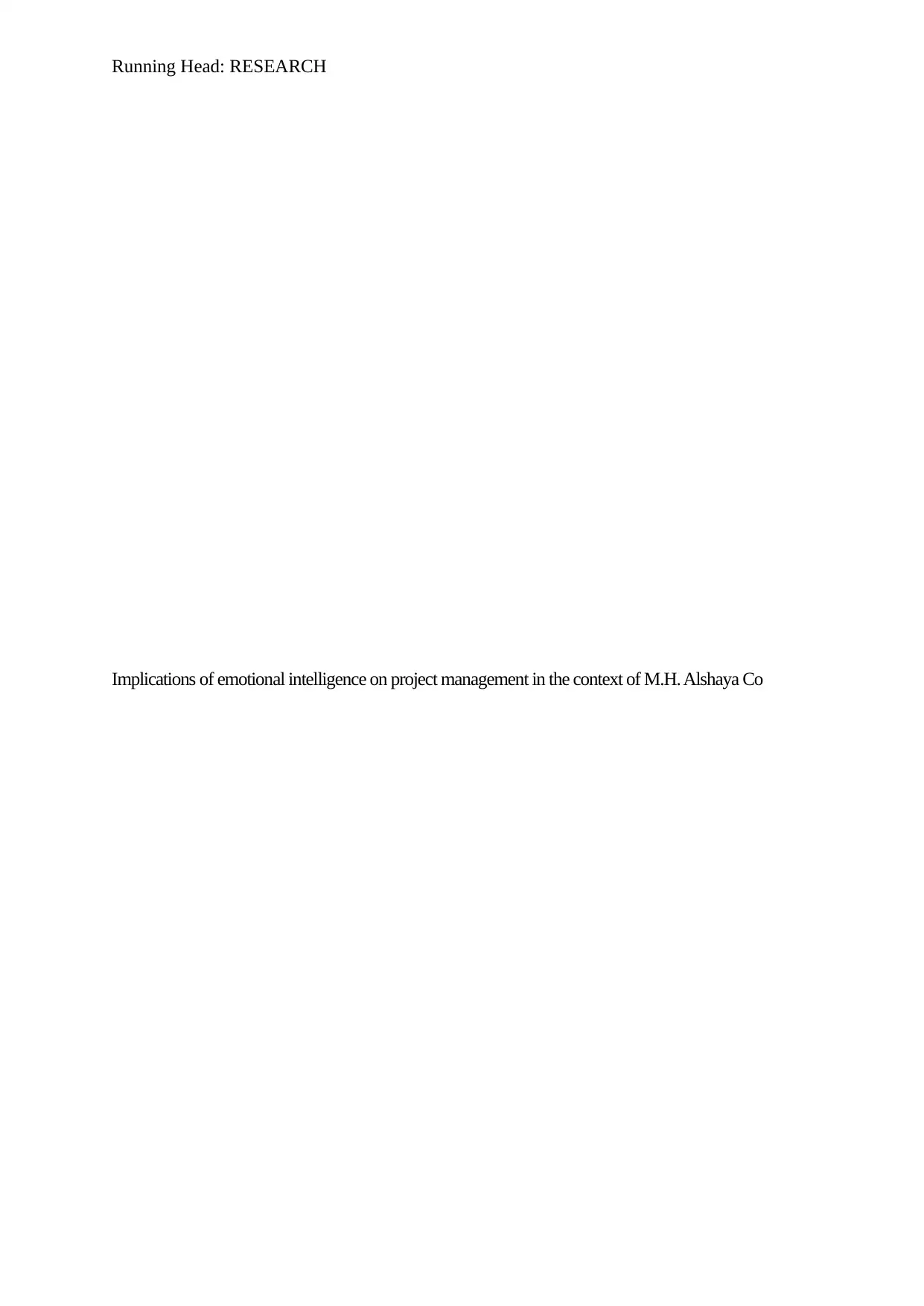
Running Head: RESEARCH
Implications of emotional intelligence on project management in the context of M.H. Alshaya Co
Implications of emotional intelligence on project management in the context of M.H. Alshaya Co
Paraphrase This Document
Need a fresh take? Get an instant paraphrase of this document with our AI Paraphraser
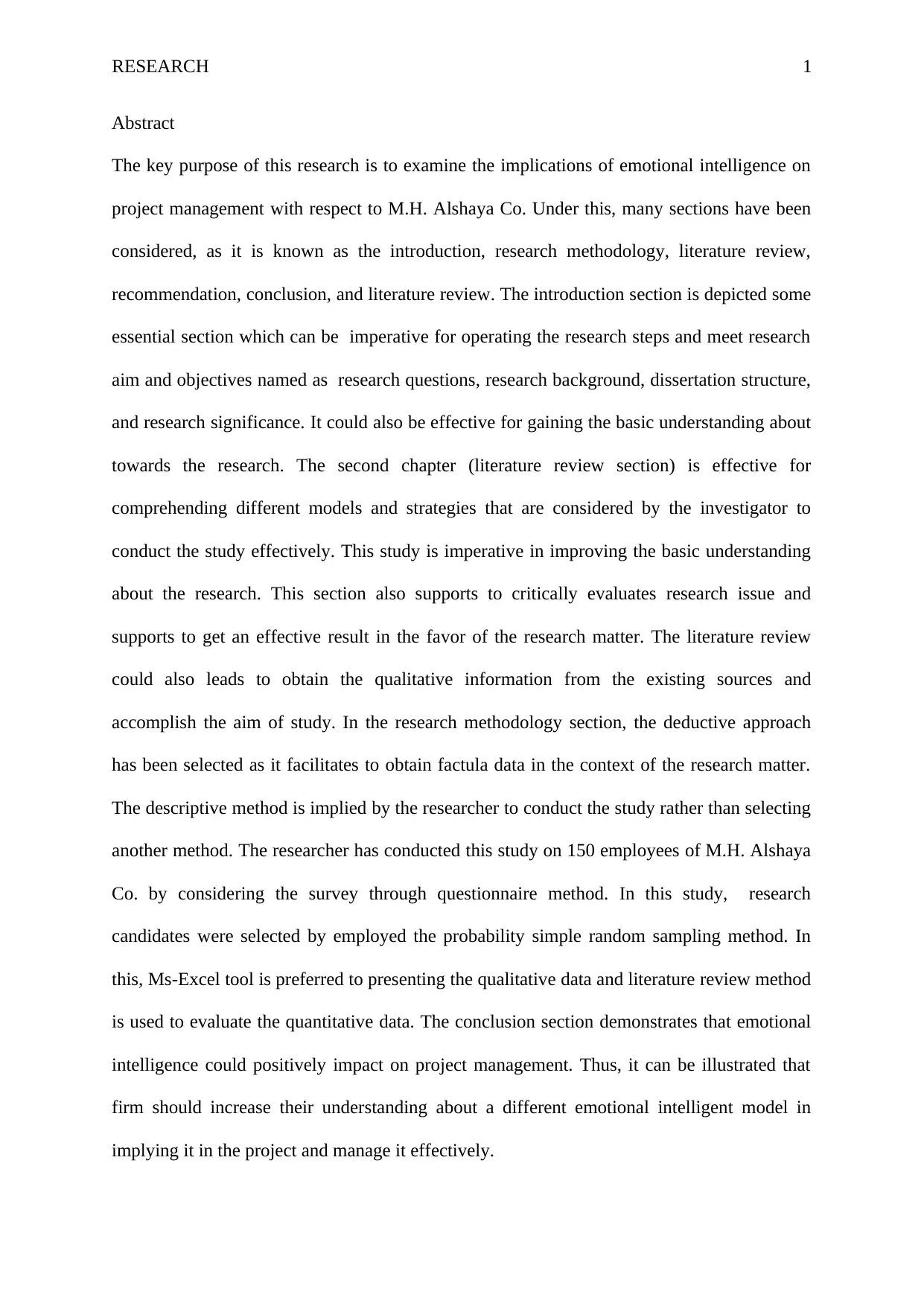
RESEARCH 1
Abstract
The key purpose of this research is to examine the implications of emotional intelligence on
project management with respect to M.H. Alshaya Co. Under this, many sections have been
considered, as it is known as the introduction, research methodology, literature review,
recommendation, conclusion, and literature review. The introduction section is depicted some
essential section which can be imperative for operating the research steps and meet research
aim and objectives named as research questions, research background, dissertation structure,
and research significance. It could also be effective for gaining the basic understanding about
towards the research. The second chapter (literature review section) is effective for
comprehending different models and strategies that are considered by the investigator to
conduct the study effectively. This study is imperative in improving the basic understanding
about the research. This section also supports to critically evaluates research issue and
supports to get an effective result in the favor of the research matter. The literature review
could also leads to obtain the qualitative information from the existing sources and
accomplish the aim of study. In the research methodology section, the deductive approach
has been selected as it facilitates to obtain factula data in the context of the research matter.
The descriptive method is implied by the researcher to conduct the study rather than selecting
another method. The researcher has conducted this study on 150 employees of M.H. Alshaya
Co. by considering the survey through questionnaire method. In this study, research
candidates were selected by employed the probability simple random sampling method. In
this, Ms-Excel tool is preferred to presenting the qualitative data and literature review method
is used to evaluate the quantitative data. The conclusion section demonstrates that emotional
intelligence could positively impact on project management. Thus, it can be illustrated that
firm should increase their understanding about a different emotional intelligent model in
implying it in the project and manage it effectively.
Abstract
The key purpose of this research is to examine the implications of emotional intelligence on
project management with respect to M.H. Alshaya Co. Under this, many sections have been
considered, as it is known as the introduction, research methodology, literature review,
recommendation, conclusion, and literature review. The introduction section is depicted some
essential section which can be imperative for operating the research steps and meet research
aim and objectives named as research questions, research background, dissertation structure,
and research significance. It could also be effective for gaining the basic understanding about
towards the research. The second chapter (literature review section) is effective for
comprehending different models and strategies that are considered by the investigator to
conduct the study effectively. This study is imperative in improving the basic understanding
about the research. This section also supports to critically evaluates research issue and
supports to get an effective result in the favor of the research matter. The literature review
could also leads to obtain the qualitative information from the existing sources and
accomplish the aim of study. In the research methodology section, the deductive approach
has been selected as it facilitates to obtain factula data in the context of the research matter.
The descriptive method is implied by the researcher to conduct the study rather than selecting
another method. The researcher has conducted this study on 150 employees of M.H. Alshaya
Co. by considering the survey through questionnaire method. In this study, research
candidates were selected by employed the probability simple random sampling method. In
this, Ms-Excel tool is preferred to presenting the qualitative data and literature review method
is used to evaluate the quantitative data. The conclusion section demonstrates that emotional
intelligence could positively impact on project management. Thus, it can be illustrated that
firm should increase their understanding about a different emotional intelligent model in
implying it in the project and manage it effectively.
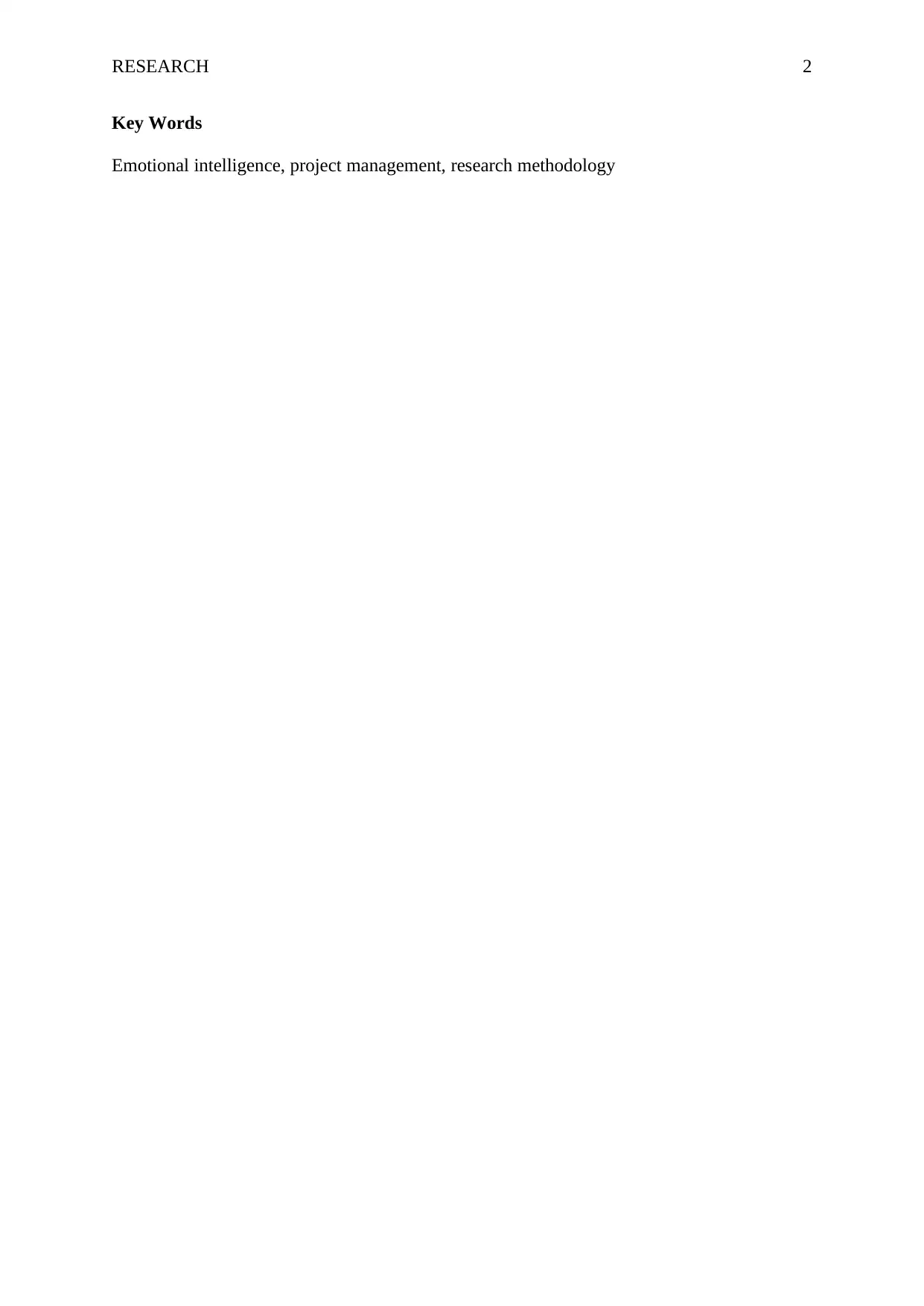
RESEARCH 2
Key Words
Emotional intelligence, project management, research methodology
Key Words
Emotional intelligence, project management, research methodology
⊘ This is a preview!⊘
Do you want full access?
Subscribe today to unlock all pages.

Trusted by 1+ million students worldwide
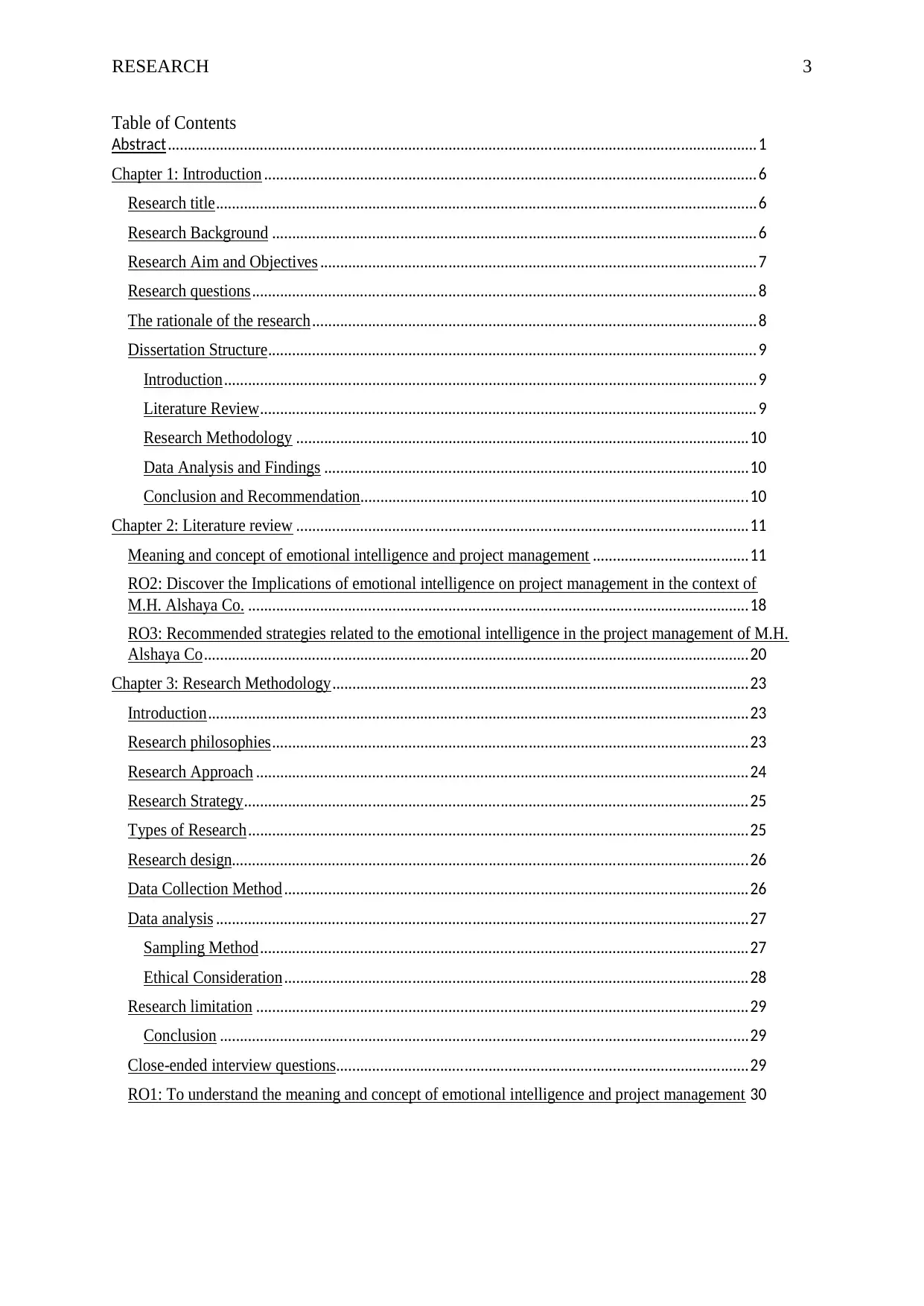
RESEARCH 3
Table of Contents
Abstract ................................................................................................................................................... 1
Chapter 1: Introduction ........................................................................................................................... 6
Research title ....................................................................................................................................... 6
Research Background ......................................................................................................................... 6
Research Aim and Objectives ............................................................................................................. 7
Research questions .............................................................................................................................. 8
The rationale of the research ............................................................................................................... 8
Dissertation Structure.......................................................................................................................... 9
Introduction ..................................................................................................................................... 9
Literature Review ............................................................................................................................ 9
Research Methodology ................................................................................................................. 10
Data Analysis and Findings .......................................................................................................... 10
Conclusion and Recommendation................................................................................................. 10
Chapter 2: Literature review ................................................................................................................. 11
Meaning and concept of emotional intelligence and project management ....................................... 11
RO2: Discover the Implications of emotional intelligence on project management in the context of
M.H. Alshaya Co. ............................................................................................................................. 18
RO3: Recommended strategies related to the emotional intelligence in the project management of M.H.
Alshaya Co ........................................................................................................................................ 20
Chapter 3: Research Methodology ........................................................................................................ 23
Introduction ....................................................................................................................................... 23
Research philosophies ....................................................................................................................... 23
Research Approach ........................................................................................................................... 24
Research Strategy .............................................................................................................................. 25
Types of Research ............................................................................................................................. 25
Research design................................................................................................................................. 26
Data Collection Method .................................................................................................................... 26
Data analysis ..................................................................................................................................... 27
Sampling Method .......................................................................................................................... 27
Ethical Consideration .................................................................................................................... 28
Research limitation ........................................................................................................................... 29
Conclusion .................................................................................................................................... 29
Close-ended interview questions....................................................................................................... 29
RO1: To understand the meaning and concept of emotional intelligence and project management 30
Table of Contents
Abstract ................................................................................................................................................... 1
Chapter 1: Introduction ........................................................................................................................... 6
Research title ....................................................................................................................................... 6
Research Background ......................................................................................................................... 6
Research Aim and Objectives ............................................................................................................. 7
Research questions .............................................................................................................................. 8
The rationale of the research ............................................................................................................... 8
Dissertation Structure.......................................................................................................................... 9
Introduction ..................................................................................................................................... 9
Literature Review ............................................................................................................................ 9
Research Methodology ................................................................................................................. 10
Data Analysis and Findings .......................................................................................................... 10
Conclusion and Recommendation................................................................................................. 10
Chapter 2: Literature review ................................................................................................................. 11
Meaning and concept of emotional intelligence and project management ....................................... 11
RO2: Discover the Implications of emotional intelligence on project management in the context of
M.H. Alshaya Co. ............................................................................................................................. 18
RO3: Recommended strategies related to the emotional intelligence in the project management of M.H.
Alshaya Co ........................................................................................................................................ 20
Chapter 3: Research Methodology ........................................................................................................ 23
Introduction ....................................................................................................................................... 23
Research philosophies ....................................................................................................................... 23
Research Approach ........................................................................................................................... 24
Research Strategy .............................................................................................................................. 25
Types of Research ............................................................................................................................. 25
Research design................................................................................................................................. 26
Data Collection Method .................................................................................................................... 26
Data analysis ..................................................................................................................................... 27
Sampling Method .......................................................................................................................... 27
Ethical Consideration .................................................................................................................... 28
Research limitation ........................................................................................................................... 29
Conclusion .................................................................................................................................... 29
Close-ended interview questions....................................................................................................... 29
RO1: To understand the meaning and concept of emotional intelligence and project management 30
Paraphrase This Document
Need a fresh take? Get an instant paraphrase of this document with our AI Paraphraser
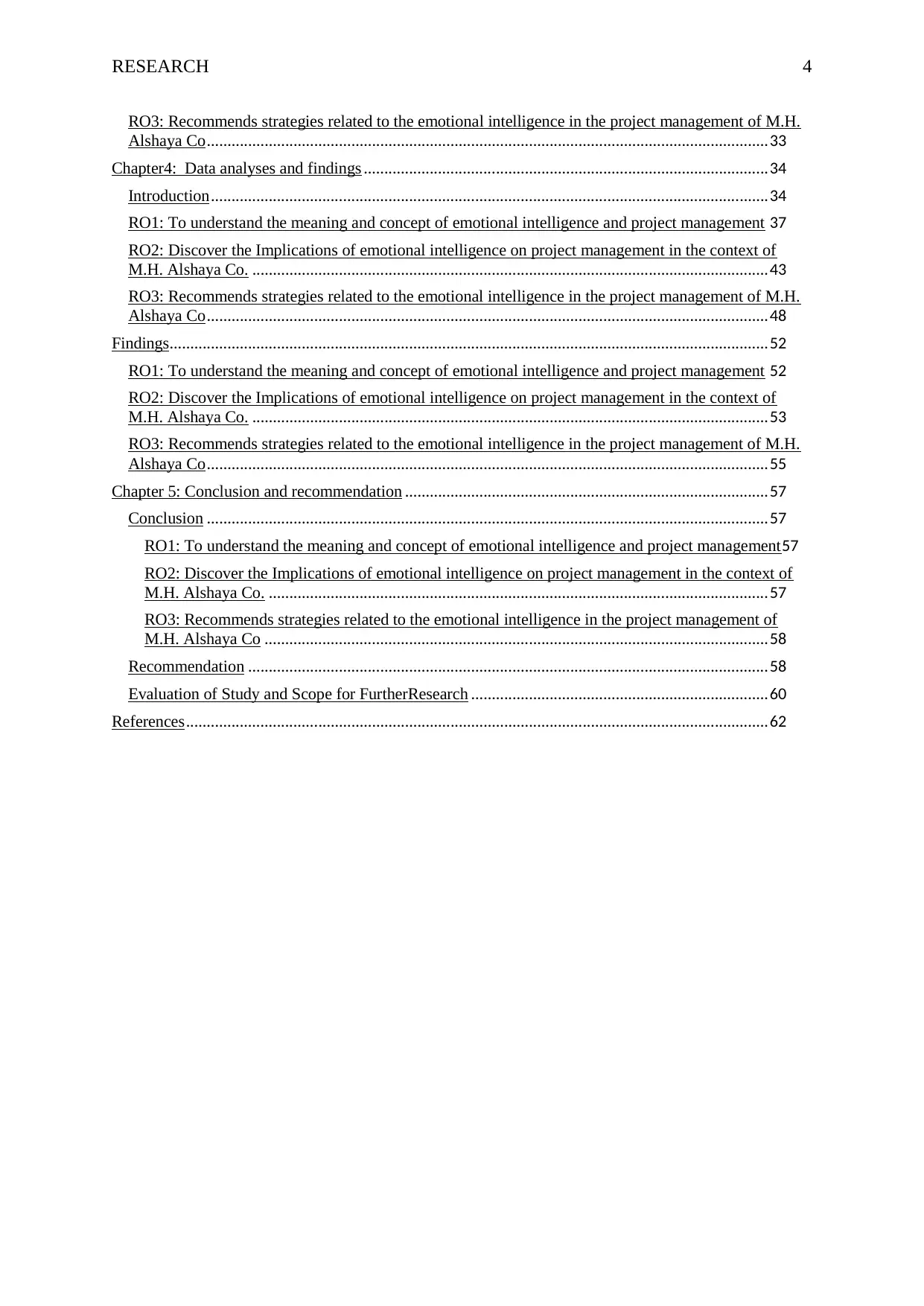
RESEARCH 4
RO3: Recommends strategies related to the emotional intelligence in the project management of M.H.
Alshaya Co ........................................................................................................................................ 33
Chapter4: Data analyses and findings .................................................................................................. 34
Introduction ....................................................................................................................................... 34
RO1: To understand the meaning and concept of emotional intelligence and project management 37
RO2: Discover the Implications of emotional intelligence on project management in the context of
M.H. Alshaya Co. ............................................................................................................................. 43
RO3: Recommends strategies related to the emotional intelligence in the project management of M.H.
Alshaya Co ........................................................................................................................................ 48
Findings................................................................................................................................................. 52
RO1: To understand the meaning and concept of emotional intelligence and project management 52
RO2: Discover the Implications of emotional intelligence on project management in the context of
M.H. Alshaya Co. ............................................................................................................................. 53
RO3: Recommends strategies related to the emotional intelligence in the project management of M.H.
Alshaya Co ........................................................................................................................................ 55
Chapter 5: Conclusion and recommendation ........................................................................................ 57
Conclusion ........................................................................................................................................ 57
RO1: To understand the meaning and concept of emotional intelligence and project management57
RO2: Discover the Implications of emotional intelligence on project management in the context of
M.H. Alshaya Co. ......................................................................................................................... 57
RO3: Recommends strategies related to the emotional intelligence in the project management of
M.H. Alshaya Co .......................................................................................................................... 58
Recommendation .............................................................................................................................. 58
Evaluation of Study and Scope for FurtherResearch ........................................................................ 60
References ............................................................................................................................................. 62
RO3: Recommends strategies related to the emotional intelligence in the project management of M.H.
Alshaya Co ........................................................................................................................................ 33
Chapter4: Data analyses and findings .................................................................................................. 34
Introduction ....................................................................................................................................... 34
RO1: To understand the meaning and concept of emotional intelligence and project management 37
RO2: Discover the Implications of emotional intelligence on project management in the context of
M.H. Alshaya Co. ............................................................................................................................. 43
RO3: Recommends strategies related to the emotional intelligence in the project management of M.H.
Alshaya Co ........................................................................................................................................ 48
Findings................................................................................................................................................. 52
RO1: To understand the meaning and concept of emotional intelligence and project management 52
RO2: Discover the Implications of emotional intelligence on project management in the context of
M.H. Alshaya Co. ............................................................................................................................. 53
RO3: Recommends strategies related to the emotional intelligence in the project management of M.H.
Alshaya Co ........................................................................................................................................ 55
Chapter 5: Conclusion and recommendation ........................................................................................ 57
Conclusion ........................................................................................................................................ 57
RO1: To understand the meaning and concept of emotional intelligence and project management57
RO2: Discover the Implications of emotional intelligence on project management in the context of
M.H. Alshaya Co. ......................................................................................................................... 57
RO3: Recommends strategies related to the emotional intelligence in the project management of
M.H. Alshaya Co .......................................................................................................................... 58
Recommendation .............................................................................................................................. 58
Evaluation of Study and Scope for FurtherResearch ........................................................................ 60
References ............................................................................................................................................. 62
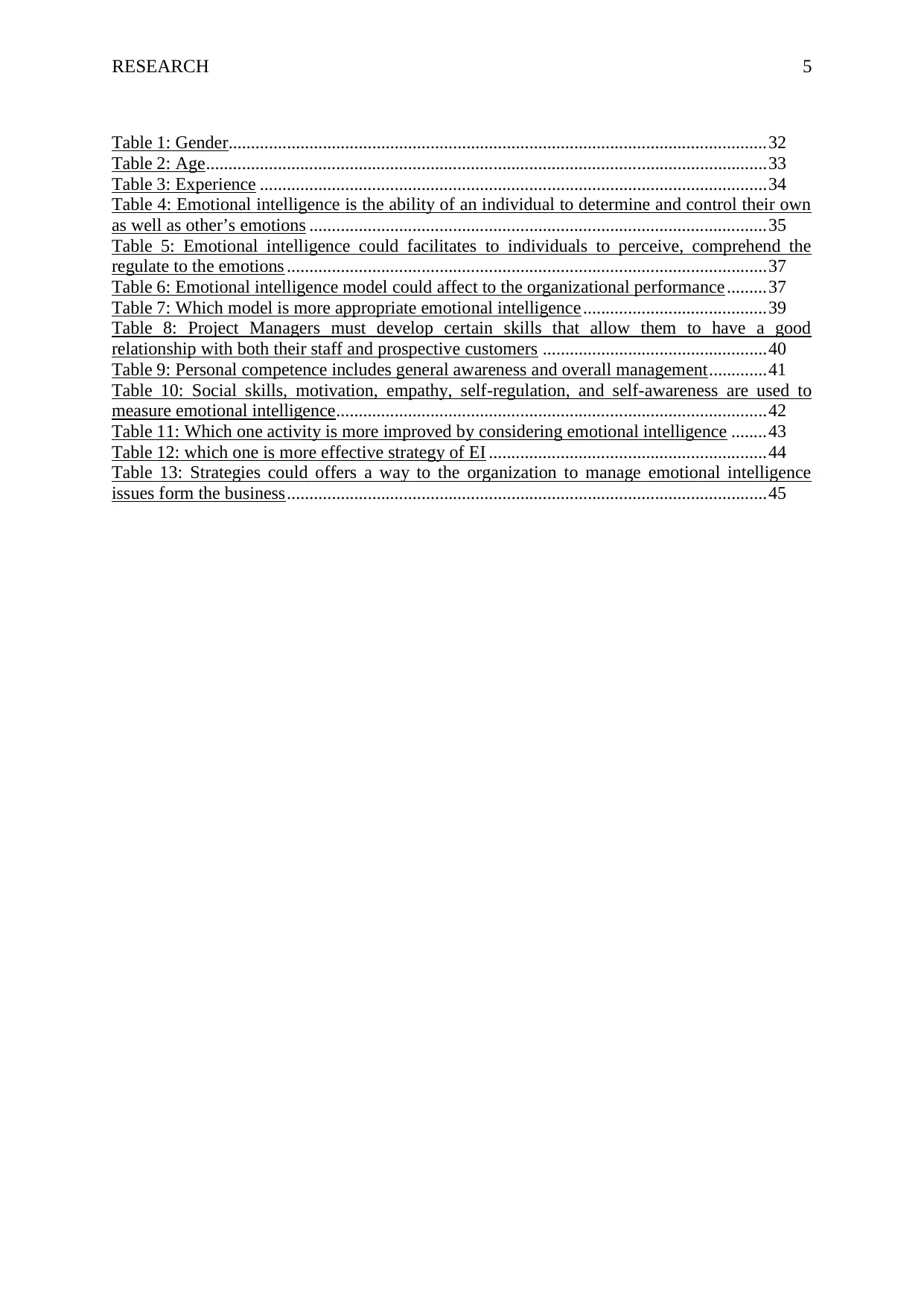
RESEARCH 5
Table 1: Gender........................................................................................................................ 32
Table 2: Age ............................................................................................................................. 33
Table 3: Experience ................................................................................................................. 34
Table 4: Emotional intelligence is the ability of an individual to determine and control their own
as well as other’s emotions ...................................................................................................... 35
Table 5: Emotional intelligence could facilitates to individuals to perceive, comprehend the
regulate to the emotions ........................................................................................................... 37
Table 6: Emotional intelligence model could affect to the organizational performance ......... 37
Table 7: Which model is more appropriate emotional intelligence ......................................... 39
Table 8: Project Managers must develop certain skills that allow them to have a good
relationship with both their staff and prospective customers .................................................. 40
Table 9: Personal competence includes general awareness and overall management ............. 41
Table 10: Social skills, motivation, empathy, self-regulation, and self-awareness are used to
measure emotional intelligence ................................................................................................ 42
Table 11: Which one activity is more improved by considering emotional intelligence ........ 43
Table 12: which one is more effective strategy of EI .............................................................. 44
Table 13: Strategies could offers a way to the organization to manage emotional intelligence
issues form the business ........................................................................................................... 45
Table 1: Gender........................................................................................................................ 32
Table 2: Age ............................................................................................................................. 33
Table 3: Experience ................................................................................................................. 34
Table 4: Emotional intelligence is the ability of an individual to determine and control their own
as well as other’s emotions ...................................................................................................... 35
Table 5: Emotional intelligence could facilitates to individuals to perceive, comprehend the
regulate to the emotions ........................................................................................................... 37
Table 6: Emotional intelligence model could affect to the organizational performance ......... 37
Table 7: Which model is more appropriate emotional intelligence ......................................... 39
Table 8: Project Managers must develop certain skills that allow them to have a good
relationship with both their staff and prospective customers .................................................. 40
Table 9: Personal competence includes general awareness and overall management ............. 41
Table 10: Social skills, motivation, empathy, self-regulation, and self-awareness are used to
measure emotional intelligence ................................................................................................ 42
Table 11: Which one activity is more improved by considering emotional intelligence ........ 43
Table 12: which one is more effective strategy of EI .............................................................. 44
Table 13: Strategies could offers a way to the organization to manage emotional intelligence
issues form the business ........................................................................................................... 45
⊘ This is a preview!⊘
Do you want full access?
Subscribe today to unlock all pages.

Trusted by 1+ million students worldwide
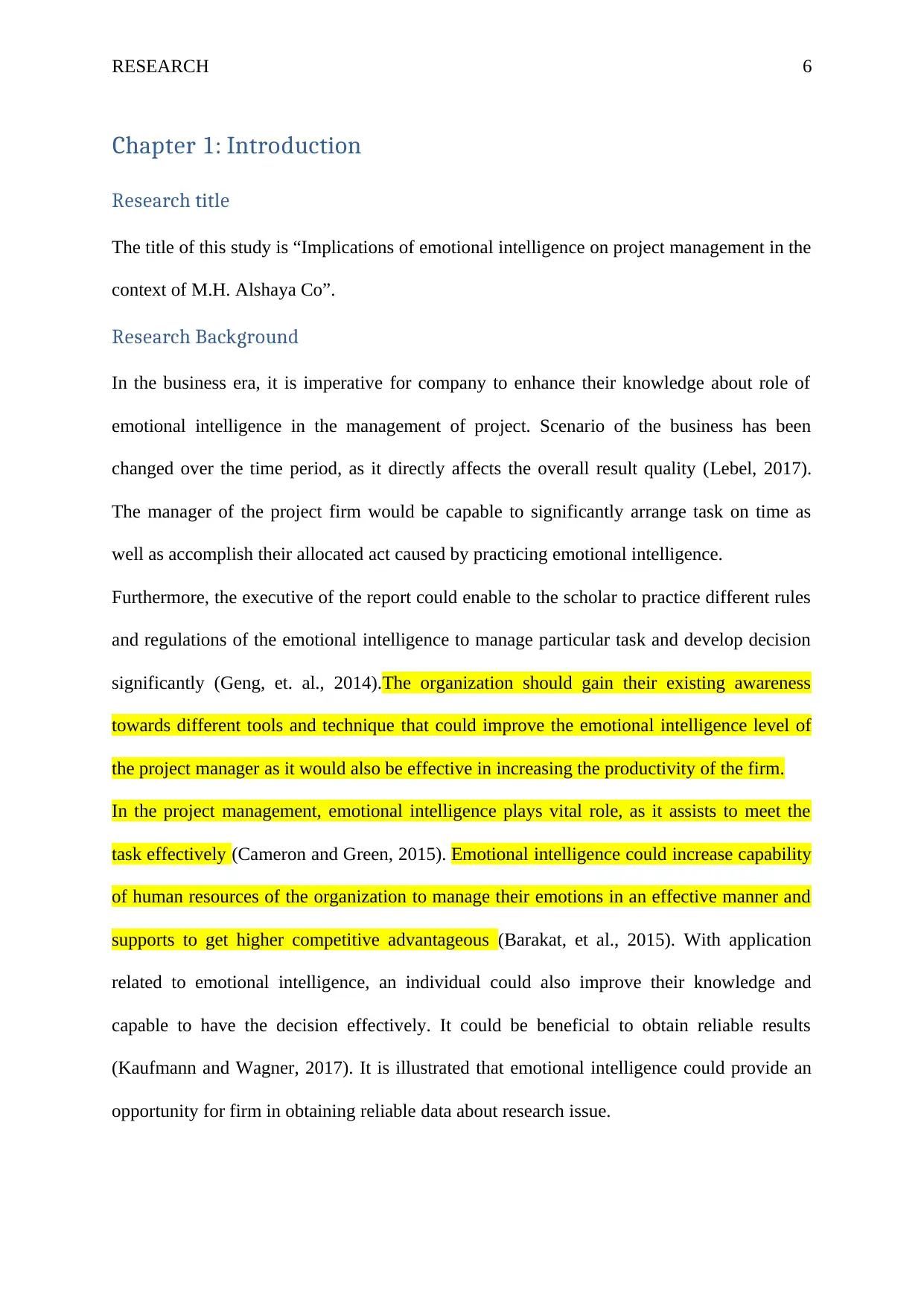
RESEARCH 6
Chapter 1: Introduction
Research title
The title of this study is “Implications of emotional intelligence on project management in the
context of M.H. Alshaya Co”.
Research Background
In the business era, it is imperative for company to enhance their knowledge about role of
emotional intelligence in the management of project. Scenario of the business has been
changed over the time period, as it directly affects the overall result quality (Lebel, 2017).
The manager of the project firm would be capable to significantly arrange task on time as
well as accomplish their allocated act caused by practicing emotional intelligence.
Furthermore, the executive of the report could enable to the scholar to practice different rules
and regulations of the emotional intelligence to manage particular task and develop decision
significantly (Geng, et. al., 2014).The organization should gain their existing awareness
towards different tools and technique that could improve the emotional intelligence level of
the project manager as it would also be effective in increasing the productivity of the firm.
In the project management, emotional intelligence plays vital role, as it assists to meet the
task effectively (Cameron and Green, 2015). Emotional intelligence could increase capability
of human resources of the organization to manage their emotions in an effective manner and
supports to get higher competitive advantageous (Barakat, et al., 2015). With application
related to emotional intelligence, an individual could also improve their knowledge and
capable to have the decision effectively. It could be beneficial to obtain reliable results
(Kaufmann and Wagner, 2017). It is illustrated that emotional intelligence could provide an
opportunity for firm in obtaining reliable data about research issue.
Chapter 1: Introduction
Research title
The title of this study is “Implications of emotional intelligence on project management in the
context of M.H. Alshaya Co”.
Research Background
In the business era, it is imperative for company to enhance their knowledge about role of
emotional intelligence in the management of project. Scenario of the business has been
changed over the time period, as it directly affects the overall result quality (Lebel, 2017).
The manager of the project firm would be capable to significantly arrange task on time as
well as accomplish their allocated act caused by practicing emotional intelligence.
Furthermore, the executive of the report could enable to the scholar to practice different rules
and regulations of the emotional intelligence to manage particular task and develop decision
significantly (Geng, et. al., 2014).The organization should gain their existing awareness
towards different tools and technique that could improve the emotional intelligence level of
the project manager as it would also be effective in increasing the productivity of the firm.
In the project management, emotional intelligence plays vital role, as it assists to meet the
task effectively (Cameron and Green, 2015). Emotional intelligence could increase capability
of human resources of the organization to manage their emotions in an effective manner and
supports to get higher competitive advantageous (Barakat, et al., 2015). With application
related to emotional intelligence, an individual could also improve their knowledge and
capable to have the decision effectively. It could be beneficial to obtain reliable results
(Kaufmann and Wagner, 2017). It is illustrated that emotional intelligence could provide an
opportunity for firm in obtaining reliable data about research issue.
Paraphrase This Document
Need a fresh take? Get an instant paraphrase of this document with our AI Paraphraser
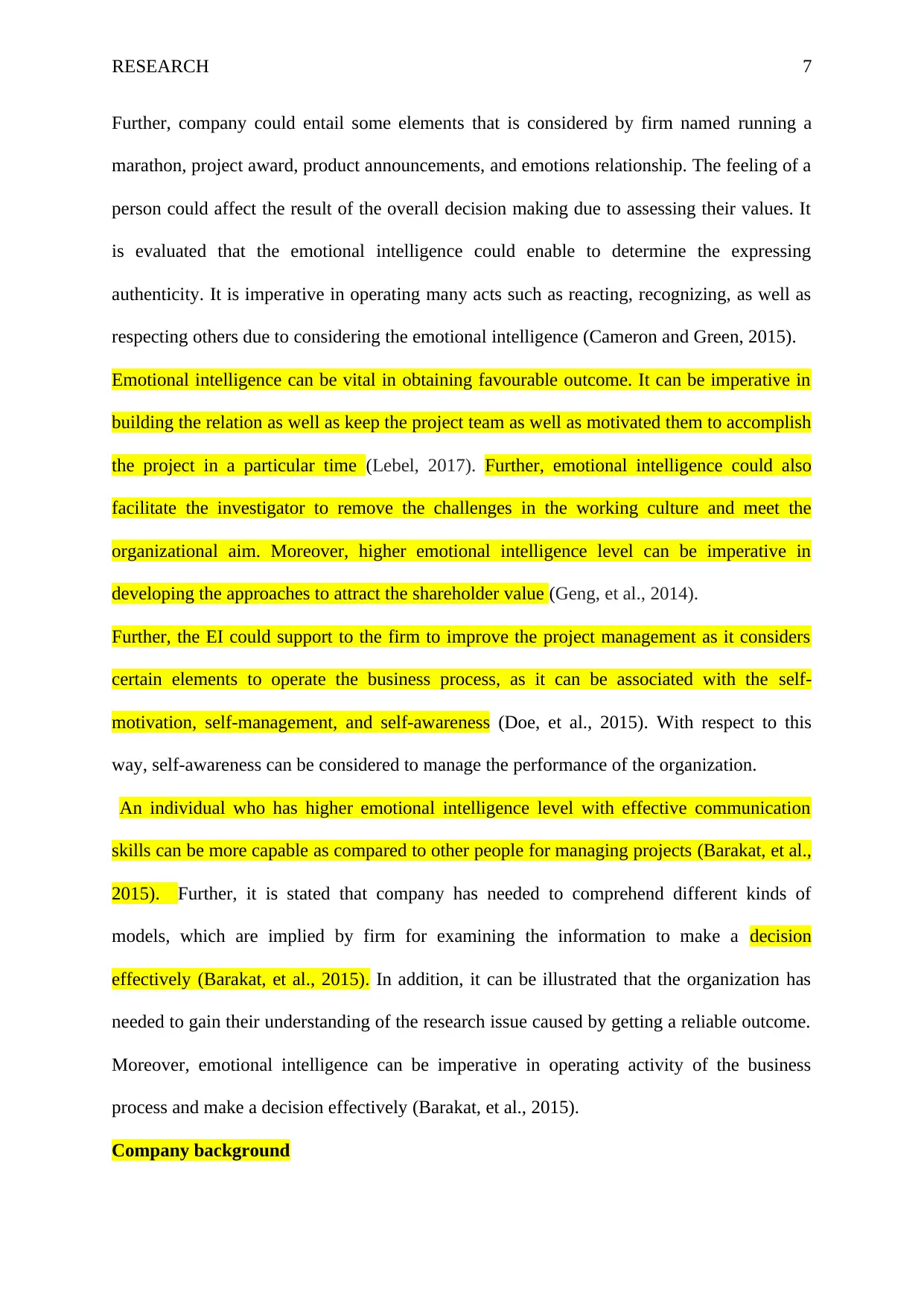
RESEARCH 7
Further, company could entail some elements that is considered by firm named running a
marathon, project award, product announcements, and emotions relationship. The feeling of a
person could affect the result of the overall decision making due to assessing their values. It
is evaluated that the emotional intelligence could enable to determine the expressing
authenticity. It is imperative in operating many acts such as reacting, recognizing, as well as
respecting others due to considering the emotional intelligence (Cameron and Green, 2015).
Emotional intelligence can be vital in obtaining favourable outcome. It can be imperative in
building the relation as well as keep the project team as well as motivated them to accomplish
the project in a particular time (Lebel, 2017). Further, emotional intelligence could also
facilitate the investigator to remove the challenges in the working culture and meet the
organizational aim. Moreover, higher emotional intelligence level can be imperative in
developing the approaches to attract the shareholder value (Geng, et al., 2014).
Further, the EI could support to the firm to improve the project management as it considers
certain elements to operate the business process, as it can be associated with the self-
motivation, self-management, and self-awareness (Doe, et al., 2015). With respect to this
way, self-awareness can be considered to manage the performance of the organization.
An individual who has higher emotional intelligence level with effective communication
skills can be more capable as compared to other people for managing projects (Barakat, et al.,
2015). Further, it is stated that company has needed to comprehend different kinds of
models, which are implied by firm for examining the information to make a decision
effectively (Barakat, et al., 2015). In addition, it can be illustrated that the organization has
needed to gain their understanding of the research issue caused by getting a reliable outcome.
Moreover, emotional intelligence can be imperative in operating activity of the business
process and make a decision effectively (Barakat, et al., 2015).
Company background
Further, company could entail some elements that is considered by firm named running a
marathon, project award, product announcements, and emotions relationship. The feeling of a
person could affect the result of the overall decision making due to assessing their values. It
is evaluated that the emotional intelligence could enable to determine the expressing
authenticity. It is imperative in operating many acts such as reacting, recognizing, as well as
respecting others due to considering the emotional intelligence (Cameron and Green, 2015).
Emotional intelligence can be vital in obtaining favourable outcome. It can be imperative in
building the relation as well as keep the project team as well as motivated them to accomplish
the project in a particular time (Lebel, 2017). Further, emotional intelligence could also
facilitate the investigator to remove the challenges in the working culture and meet the
organizational aim. Moreover, higher emotional intelligence level can be imperative in
developing the approaches to attract the shareholder value (Geng, et al., 2014).
Further, the EI could support to the firm to improve the project management as it considers
certain elements to operate the business process, as it can be associated with the self-
motivation, self-management, and self-awareness (Doe, et al., 2015). With respect to this
way, self-awareness can be considered to manage the performance of the organization.
An individual who has higher emotional intelligence level with effective communication
skills can be more capable as compared to other people for managing projects (Barakat, et al.,
2015). Further, it is stated that company has needed to comprehend different kinds of
models, which are implied by firm for examining the information to make a decision
effectively (Barakat, et al., 2015). In addition, it can be illustrated that the organization has
needed to gain their understanding of the research issue caused by getting a reliable outcome.
Moreover, emotional intelligence can be imperative in operating activity of the business
process and make a decision effectively (Barakat, et al., 2015).
Company background
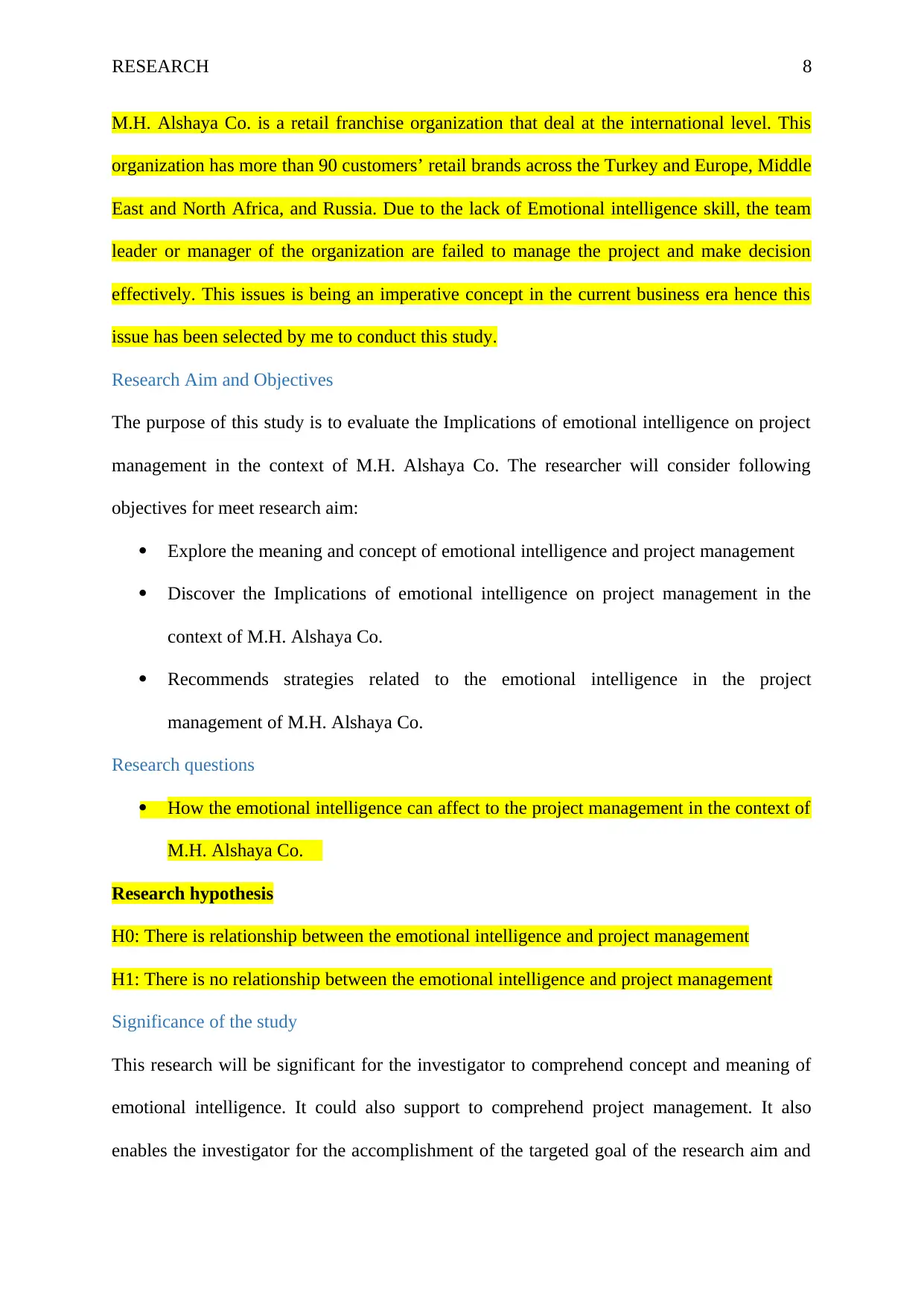
RESEARCH 8
M.H. Alshaya Co. is a retail franchise organization that deal at the international level. This
organization has more than 90 customers’ retail brands across the Turkey and Europe, Middle
East and North Africa, and Russia. Due to the lack of Emotional intelligence skill, the team
leader or manager of the organization are failed to manage the project and make decision
effectively. This issues is being an imperative concept in the current business era hence this
issue has been selected by me to conduct this study.
Research Aim and Objectives
The purpose of this study is to evaluate the Implications of emotional intelligence on project
management in the context of M.H. Alshaya Co. The researcher will consider following
objectives for meet research aim:
Explore the meaning and concept of emotional intelligence and project management
Discover the Implications of emotional intelligence on project management in the
context of M.H. Alshaya Co.
Recommends strategies related to the emotional intelligence in the project
management of M.H. Alshaya Co.
Research questions
How the emotional intelligence can affect to the project management in the context of
M.H. Alshaya Co.
Research hypothesis
H0: There is relationship between the emotional intelligence and project management
H1: There is no relationship between the emotional intelligence and project management
Significance of the study
This research will be significant for the investigator to comprehend concept and meaning of
emotional intelligence. It could also support to comprehend project management. It also
enables the investigator for the accomplishment of the targeted goal of the research aim and
M.H. Alshaya Co. is a retail franchise organization that deal at the international level. This
organization has more than 90 customers’ retail brands across the Turkey and Europe, Middle
East and North Africa, and Russia. Due to the lack of Emotional intelligence skill, the team
leader or manager of the organization are failed to manage the project and make decision
effectively. This issues is being an imperative concept in the current business era hence this
issue has been selected by me to conduct this study.
Research Aim and Objectives
The purpose of this study is to evaluate the Implications of emotional intelligence on project
management in the context of M.H. Alshaya Co. The researcher will consider following
objectives for meet research aim:
Explore the meaning and concept of emotional intelligence and project management
Discover the Implications of emotional intelligence on project management in the
context of M.H. Alshaya Co.
Recommends strategies related to the emotional intelligence in the project
management of M.H. Alshaya Co.
Research questions
How the emotional intelligence can affect to the project management in the context of
M.H. Alshaya Co.
Research hypothesis
H0: There is relationship between the emotional intelligence and project management
H1: There is no relationship between the emotional intelligence and project management
Significance of the study
This research will be significant for the investigator to comprehend concept and meaning of
emotional intelligence. It could also support to comprehend project management. It also
enables the investigator for the accomplishment of the targeted goal of the research aim and
⊘ This is a preview!⊘
Do you want full access?
Subscribe today to unlock all pages.

Trusted by 1+ million students worldwide
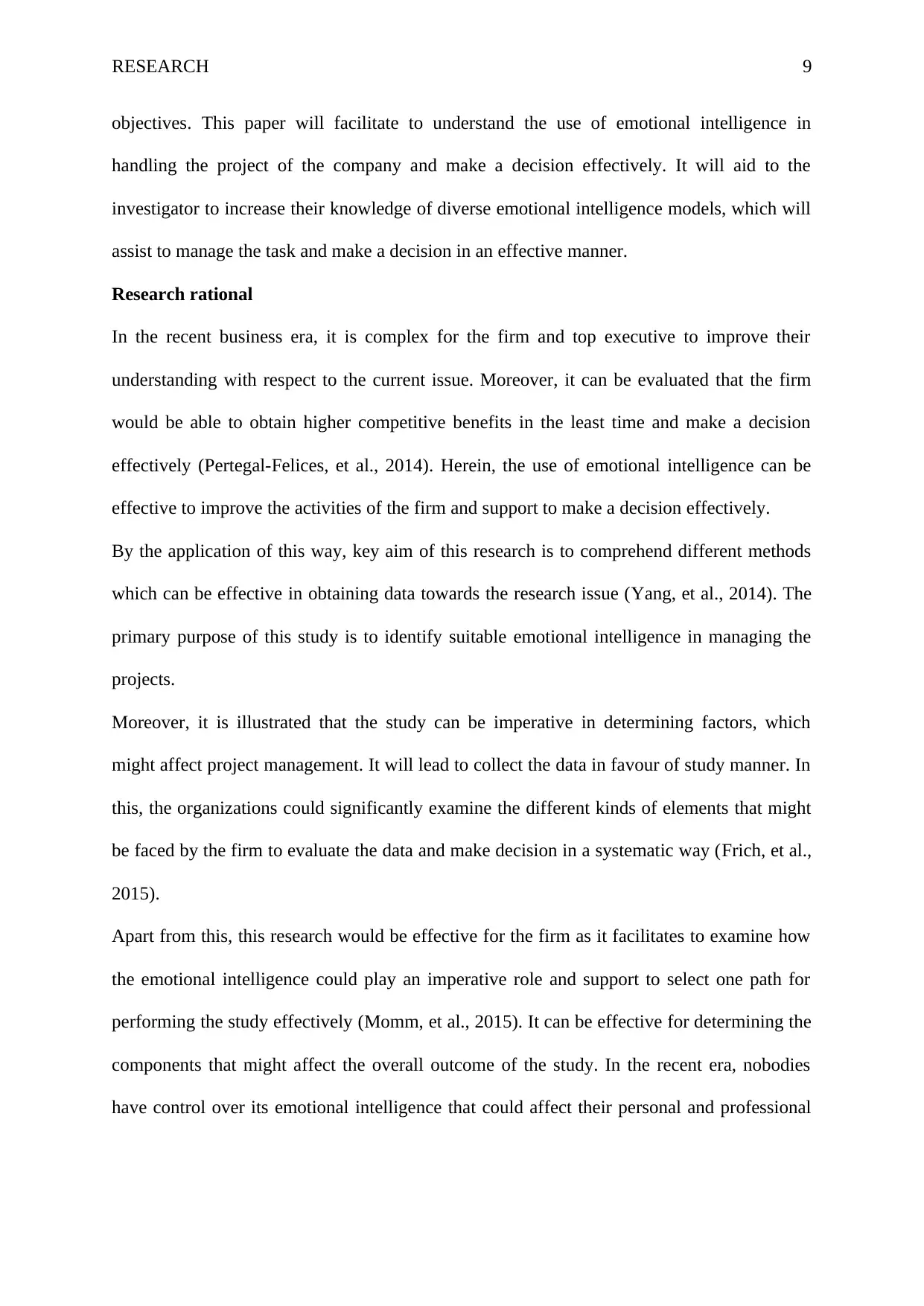
RESEARCH 9
objectives. This paper will facilitate to understand the use of emotional intelligence in
handling the project of the company and make a decision effectively. It will aid to the
investigator to increase their knowledge of diverse emotional intelligence models, which will
assist to manage the task and make a decision in an effective manner.
Research rational
In the recent business era, it is complex for the firm and top executive to improve their
understanding with respect to the current issue. Moreover, it can be evaluated that the firm
would be able to obtain higher competitive benefits in the least time and make a decision
effectively (Pertegal-Felices, et al., 2014). Herein, the use of emotional intelligence can be
effective to improve the activities of the firm and support to make a decision effectively.
By the application of this way, key aim of this research is to comprehend different methods
which can be effective in obtaining data towards the research issue (Yang, et al., 2014). The
primary purpose of this study is to identify suitable emotional intelligence in managing the
projects.
Moreover, it is illustrated that the study can be imperative in determining factors, which
might affect project management. It will lead to collect the data in favour of study manner. In
this, the organizations could significantly examine the different kinds of elements that might
be faced by the firm to evaluate the data and make decision in a systematic way (Frich, et al.,
2015).
Apart from this, this research would be effective for the firm as it facilitates to examine how
the emotional intelligence could play an imperative role and support to select one path for
performing the study effectively (Momm, et al., 2015). It can be effective for determining the
components that might affect the overall outcome of the study. In the recent era, nobodies
have control over its emotional intelligence that could affect their personal and professional
objectives. This paper will facilitate to understand the use of emotional intelligence in
handling the project of the company and make a decision effectively. It will aid to the
investigator to increase their knowledge of diverse emotional intelligence models, which will
assist to manage the task and make a decision in an effective manner.
Research rational
In the recent business era, it is complex for the firm and top executive to improve their
understanding with respect to the current issue. Moreover, it can be evaluated that the firm
would be able to obtain higher competitive benefits in the least time and make a decision
effectively (Pertegal-Felices, et al., 2014). Herein, the use of emotional intelligence can be
effective to improve the activities of the firm and support to make a decision effectively.
By the application of this way, key aim of this research is to comprehend different methods
which can be effective in obtaining data towards the research issue (Yang, et al., 2014). The
primary purpose of this study is to identify suitable emotional intelligence in managing the
projects.
Moreover, it is illustrated that the study can be imperative in determining factors, which
might affect project management. It will lead to collect the data in favour of study manner. In
this, the organizations could significantly examine the different kinds of elements that might
be faced by the firm to evaluate the data and make decision in a systematic way (Frich, et al.,
2015).
Apart from this, this research would be effective for the firm as it facilitates to examine how
the emotional intelligence could play an imperative role and support to select one path for
performing the study effectively (Momm, et al., 2015). It can be effective for determining the
components that might affect the overall outcome of the study. In the recent era, nobodies
have control over its emotional intelligence that could affect their personal and professional
Paraphrase This Document
Need a fresh take? Get an instant paraphrase of this document with our AI Paraphraser
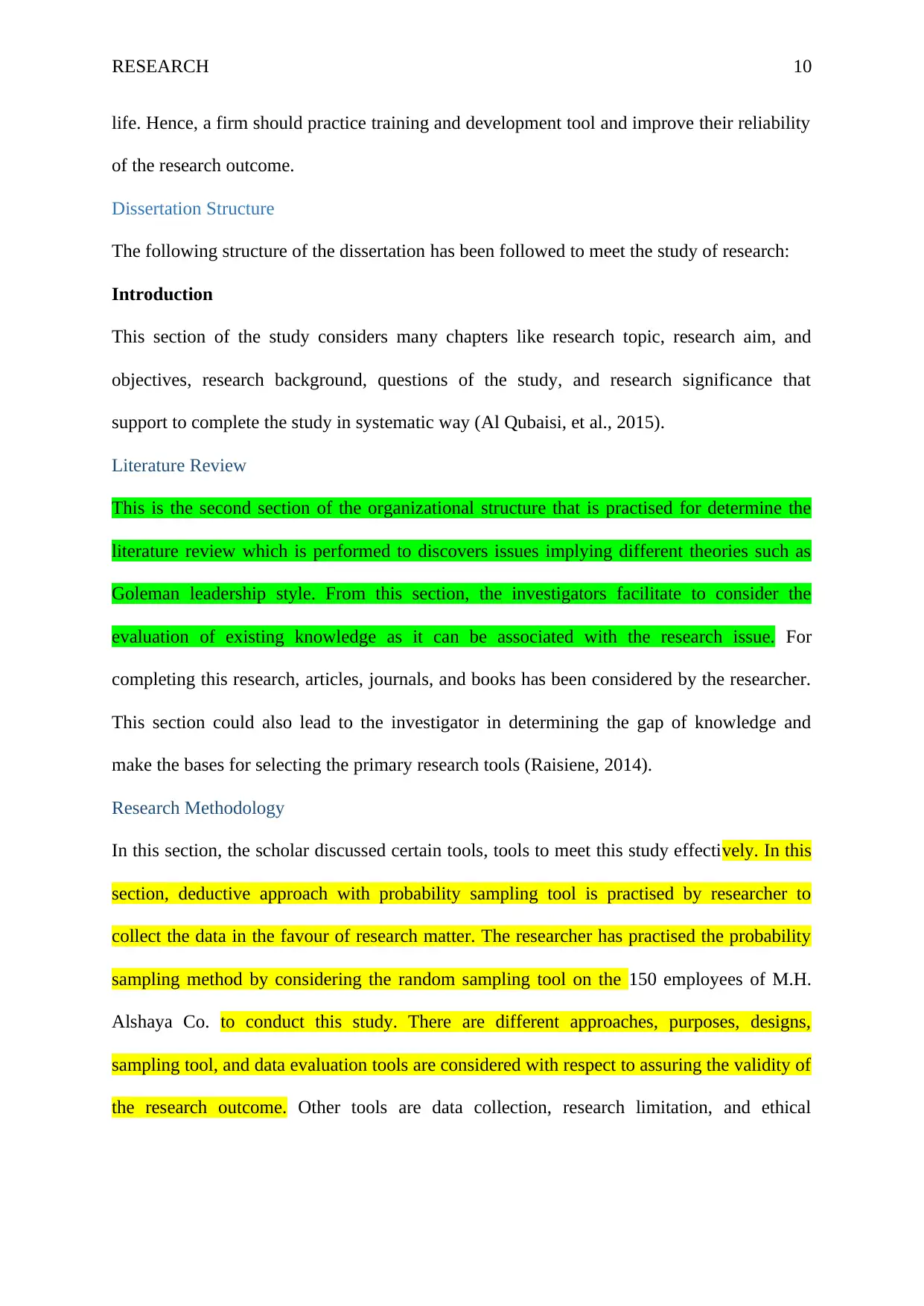
RESEARCH 10
life. Hence, a firm should practice training and development tool and improve their reliability
of the research outcome.
Dissertation Structure
The following structure of the dissertation has been followed to meet the study of research:
Introduction
This section of the study considers many chapters like research topic, research aim, and
objectives, research background, questions of the study, and research significance that
support to complete the study in systematic way (Al Qubaisi, et al., 2015).
Literature Review
This is the second section of the organizational structure that is practised for determine the
literature review which is performed to discovers issues implying different theories such as
Goleman leadership style. From this section, the investigators facilitate to consider the
evaluation of existing knowledge as it can be associated with the research issue. For
completing this research, articles, journals, and books has been considered by the researcher.
This section could also lead to the investigator in determining the gap of knowledge and
make the bases for selecting the primary research tools (Raisiene, 2014).
Research Methodology
In this section, the scholar discussed certain tools, tools to meet this study effectively. In this
section, deductive approach with probability sampling tool is practised by researcher to
collect the data in the favour of research matter. The researcher has practised the probability
sampling method by considering the random sampling tool on the 150 employees of M.H.
Alshaya Co. to conduct this study. There are different approaches, purposes, designs,
sampling tool, and data evaluation tools are considered with respect to assuring the validity of
the research outcome. Other tools are data collection, research limitation, and ethical
life. Hence, a firm should practice training and development tool and improve their reliability
of the research outcome.
Dissertation Structure
The following structure of the dissertation has been followed to meet the study of research:
Introduction
This section of the study considers many chapters like research topic, research aim, and
objectives, research background, questions of the study, and research significance that
support to complete the study in systematic way (Al Qubaisi, et al., 2015).
Literature Review
This is the second section of the organizational structure that is practised for determine the
literature review which is performed to discovers issues implying different theories such as
Goleman leadership style. From this section, the investigators facilitate to consider the
evaluation of existing knowledge as it can be associated with the research issue. For
completing this research, articles, journals, and books has been considered by the researcher.
This section could also lead to the investigator in determining the gap of knowledge and
make the bases for selecting the primary research tools (Raisiene, 2014).
Research Methodology
In this section, the scholar discussed certain tools, tools to meet this study effectively. In this
section, deductive approach with probability sampling tool is practised by researcher to
collect the data in the favour of research matter. The researcher has practised the probability
sampling method by considering the random sampling tool on the 150 employees of M.H.
Alshaya Co. to conduct this study. There are different approaches, purposes, designs,
sampling tool, and data evaluation tools are considered with respect to assuring the validity of
the research outcome. Other tools are data collection, research limitation, and ethical
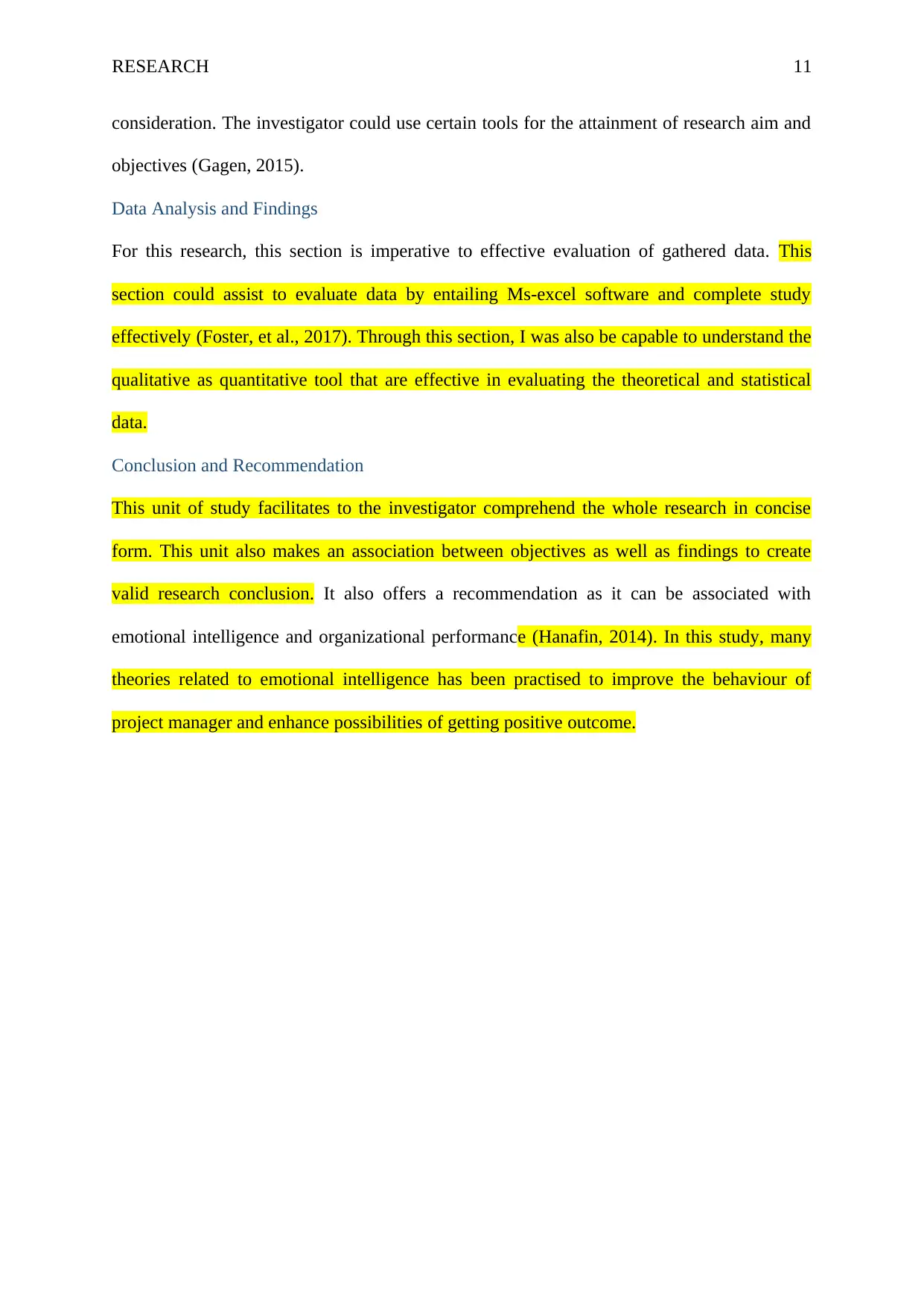
RESEARCH 11
consideration. The investigator could use certain tools for the attainment of research aim and
objectives (Gagen, 2015).
Data Analysis and Findings
For this research, this section is imperative to effective evaluation of gathered data. This
section could assist to evaluate data by entailing Ms-excel software and complete study
effectively (Foster, et al., 2017). Through this section, I was also be capable to understand the
qualitative as quantitative tool that are effective in evaluating the theoretical and statistical
data.
Conclusion and Recommendation
This unit of study facilitates to the investigator comprehend the whole research in concise
form. This unit also makes an association between objectives as well as findings to create
valid research conclusion. It also offers a recommendation as it can be associated with
emotional intelligence and organizational performance (Hanafin, 2014). In this study, many
theories related to emotional intelligence has been practised to improve the behaviour of
project manager and enhance possibilities of getting positive outcome.
consideration. The investigator could use certain tools for the attainment of research aim and
objectives (Gagen, 2015).
Data Analysis and Findings
For this research, this section is imperative to effective evaluation of gathered data. This
section could assist to evaluate data by entailing Ms-excel software and complete study
effectively (Foster, et al., 2017). Through this section, I was also be capable to understand the
qualitative as quantitative tool that are effective in evaluating the theoretical and statistical
data.
Conclusion and Recommendation
This unit of study facilitates to the investigator comprehend the whole research in concise
form. This unit also makes an association between objectives as well as findings to create
valid research conclusion. It also offers a recommendation as it can be associated with
emotional intelligence and organizational performance (Hanafin, 2014). In this study, many
theories related to emotional intelligence has been practised to improve the behaviour of
project manager and enhance possibilities of getting positive outcome.
⊘ This is a preview!⊘
Do you want full access?
Subscribe today to unlock all pages.

Trusted by 1+ million students worldwide
1 out of 65
Related Documents
Your All-in-One AI-Powered Toolkit for Academic Success.
+13062052269
info@desklib.com
Available 24*7 on WhatsApp / Email
![[object Object]](/_next/static/media/star-bottom.7253800d.svg)
Unlock your academic potential
Copyright © 2020–2026 A2Z Services. All Rights Reserved. Developed and managed by ZUCOL.





